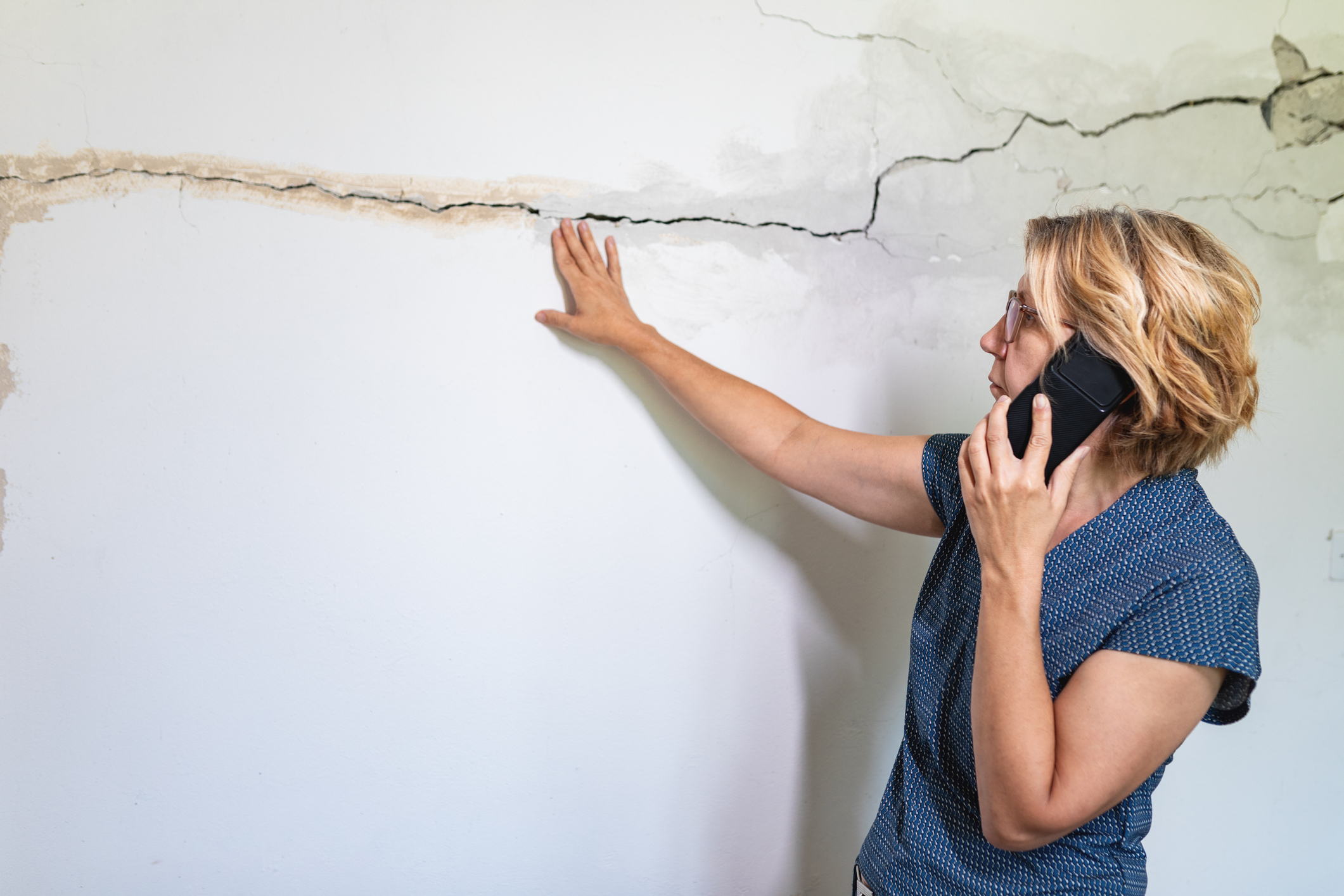Should You Get Earthquake Insurance?
Your home insurance doesn’t cover earthquakes, but paying extra for earthquake insurance isn’t just for Californians.

Profit and prosper with the best of Kiplinger's advice on investing, taxes, retirement, personal finance and much more. Delivered daily. Enter your email in the box and click Sign Me Up.
You are now subscribed
Your newsletter sign-up was successful
Want to add more newsletters?

Delivered daily
Kiplinger Today
Profit and prosper with the best of Kiplinger's advice on investing, taxes, retirement, personal finance and much more delivered daily. Smart money moves start here.

Sent five days a week
Kiplinger A Step Ahead
Get practical help to make better financial decisions in your everyday life, from spending to savings on top deals.

Delivered daily
Kiplinger Closing Bell
Get today's biggest financial and investing headlines delivered to your inbox every day the U.S. stock market is open.

Sent twice a week
Kiplinger Adviser Intel
Financial pros across the country share best practices and fresh tactics to preserve and grow your wealth.

Delivered weekly
Kiplinger Tax Tips
Trim your federal and state tax bills with practical tax-planning and tax-cutting strategies.

Sent twice a week
Kiplinger Retirement Tips
Your twice-a-week guide to planning and enjoying a financially secure and richly rewarding retirement

Sent bimonthly.
Kiplinger Adviser Angle
Insights for advisers, wealth managers and other financial professionals.

Sent twice a week
Kiplinger Investing Weekly
Your twice-a-week roundup of promising stocks, funds, companies and industries you should consider, ones you should avoid, and why.

Sent weekly for six weeks
Kiplinger Invest for Retirement
Your step-by-step six-part series on how to invest for retirement, from devising a successful strategy to exactly which investments to choose.
The damage an earthquake can cause to your home really seems like something that home insurance would cover, but many insurance companies stopped covering earthquakes in the 1990s, according to FEMA.
As a result, only a fraction of homeowners living in earthquake-prone areas are covered. California, for example, experiences 90% of all the earthquakes that happen in the United States. Yet, just 13% of the state’s residents have earthquake insurance.
California isn’t the only state where earthquakes happen. According to the National Association of Insurance Commissioners (NAIC), there is some risk of an earthquake in 42 states. The risk is higher in some states compared to others, but shopping for home insurance that includes earthquake coverage isn’t just for Californians.
From just $107.88 $24.99 for Kiplinger Personal Finance
Become a smarter, better informed investor. Subscribe from just $107.88 $24.99, plus get up to 4 Special Issues

Sign up for Kiplinger’s Free Newsletters
Profit and prosper with the best of expert advice on investing, taxes, retirement, personal finance and more - straight to your e-mail.
Profit and prosper with the best of expert advice - straight to your e-mail.
Does home insurance cover earthquakes?

Standard home insurance usually does not include earthquakes or other land movements, like landslides. You need to add an earthquake insurance policy, which often covers any damage that results directly from the earthquake itself or its aftershocks, but not damages that would be covered by your standard home insurance.
Here’s a breakdown of what a typical earthquake policy might include:
- Earthquake insurance covers damage to the insured property that directly resulted from the ground shaking. That might include things like a cracked foundation, crumbling exterior or belongings that broke as a result of falling during the quake.
- It may also cover your living expenses if you can’t live in your home while it’s being repaired, up to a specified limit.
- For repairs of covered damage, the policy will also typically cover the cost of building code upgrades and emergency repairs.
- Damages caused by aftershocks within about 72 hours of the initial earthquake can usually be lumped together into a single claim (with a single deductible).
- For renters, the coverage only applies to your personal property, not to the building itself. You may also be able to add loss of use coverage to pay for any living expenses if you have to move out while the landlord makes repairs.
- Earthquake insurance does not cover damage from disasters that might be triggered by an earthquake, like fires or water damage resulting from a water pipe that burst during the quake. For those, you’d file a separate claim with your standard home insurance.
You’ll usually see a deductible of between 2% and 20% of the total insured value. The higher the deductible, the more you’re agreeing to pay out of pocket in the event an earthquake damages your home.
You might even see separate deductibles for separate types of coverage, such as the house itself, your belongings inside and any separate structures outside.
Which states are most likely to have earthquakes?

According to the U.S. Geological Survey, 16 U.S. states have an above average risk of experiencing an earthquake:
- Alaska
- Arkansas
- California
- Hawaii
- Idaho
- Illinois
- Kentucky
- Missouri
- Montana
- Nevada
- Oregon
- South Carolina
- Tennessee
- Utah
- Washington
- Wyoming
The likelihood of an earthquake varies considerably among those states, with states west of the Rockies, especially California, having the highest risk.
But states in central and eastern parts of the United States face their own unique risks: earthquakes are less common, but when they do happen, they tend to spread out further from their epicenter and houses are less likely to be built to withstand the shaking.
If you live in any of these states and you don’t currently have earthquake insurance, it’s time to start looking into your coverage options.
In some cases, you may be able to simply add the coverage to a standard home insurance policy. If that’s not an option, you’ll have to buy separate earthquake insurance.
Either way, you can start your search by using our Bankrate-powered tool below to get quotes on home insurance:
Which states are least likely to have earthquakes?

While it’s still worth looking into your regional risk of an earthquake even if you don’t live in one of the 16 higher risk states, there are a few states in the U.S. where earthquakes are very unlikely:
- Florida
- Iowa
- Minnesota
- North Dakota
- Wisconsin
If you live in one of these states, you can probably skip earthquake insurance. Though, it’s still worth looking into other types of land movement coverage like landslides or sinkholes – both of which are also surprisingly not covered by standard home insurance.
How much does earthquake insurance cost?

A typical earthquake policy will cost between $0.50 and $15 per $1,000 of coverage, according to the Insurance Information Institute.
So for $300,000 worth of coverage, you might see a quote ranging from $150 up to $4,500 depending on where you live, the type of home you live in, what kind of coverage you want and other factors.
In California, you can expect to see the highest premiums, with earthquake policies costing above $1,300 per year on average, according to Lending Tree.
In Texas, you can expect to pay between $500 and $800 per year for earthquake coverage. On the East Coast, premiums are typically cheap, averaging around $300 or less.
One way to lower your premium is to increase your deductible. If you live outside of California, where earthquakes are a risk but far less likely, opting for a higher deductible can be a good compromise.
You’ll keep your premium down, but still have coverage in the event of a once-in-a-lifetime disaster.
Another way to save is to have your home retrofitted. Seismic retrofitting involves things like installing bracing and bolting around your home’s frame and foundation to make the structure more resistant to earthquake damage.
This can not only lower your premium, but decrease your risk of experiencing serious damage during an earthquake.
Complete Earthquake Bag - 3 Day Emergency kit for Earthquakes, Hurricanes, Wildfires, Floods + Other disasters.
Does renter’s insurance cover earthquakes?

Not a homeowner? Even if you rent, earthquake insurance could still be a necessity. Like home insurance, standard renter’s insurance policies exclude earthquake damage.
If your landlord has earthquake insurance, that policy only protects the building itself, not your belongings.
So, if you’re renting in one of the higher-risk zones identified by the USGS, you should look into both renter’s insurance and earthquake coverage to make sure you’re fully protected.
Since you’re not paying for coverage of the building itself, you can usually get earthquake insurance for much less than a homeowner would pay.
Is earthquake insurance worth it?
Home insurance isn’t cheap (especially if you live in one of the eight states where premiums are highest) so if you’re hesitant about spending even more to add earthquake insurance, you’re not alone.
But the potential savings if you do have an earthquake can make that extra cost worth it if you live in one of the states where earthquakes are possible.
According to Home Advisor, the average cost to repair earthquake damage ranges from $5,000 to $25,000. Even if you live in one of the lower-risk states, the savings from a single claim could more than make up for years of premium payments.
Related content
Profit and prosper with the best of Kiplinger's advice on investing, taxes, retirement, personal finance and much more. Delivered daily. Enter your email in the box and click Sign Me Up.

Rachael Green is a personal finance eCommerce writer specializing in insurance, travel, and credit cards. Before joining Kiplinger in 2025, she wrote blogs and whitepapers for financial advisors and reported on everything from the latest business news and investing trends to the best shopping deals. Her bylines have appeared in Benzinga, CBS News, Travel + Leisure, Bustle, and numerous other publications. A former digital nomad, Rachael lived in Lund, Vienna, and New York before settling down in Atlanta. She’s eager to share her tips for finding the best travel deals and navigating the logistics of managing money while living abroad. When she’s not researching the latest insurance trends or sharing the best credit card reward hacks, Rachael can be found traveling or working in her garden.
-
 Quiz: Do You Know How to Avoid the "Medigap Trap?"
Quiz: Do You Know How to Avoid the "Medigap Trap?"Quiz Test your basic knowledge of the "Medigap Trap" in our quick quiz.
-
 5 Top Tax-Efficient Mutual Funds for Smarter Investing
5 Top Tax-Efficient Mutual Funds for Smarter InvestingMutual funds are many things, but "tax-friendly" usually isn't one of them. These are the exceptions.
-
 AI Sparks Existential Crisis for Software Stocks
AI Sparks Existential Crisis for Software StocksThe Kiplinger Letter Fears that SaaS subscription software could be rendered obsolete by artificial intelligence make investors jittery.
-
 One of the Most Powerful Wealth-Building Moves a Woman Can Make: A Midcareer Pivot
One of the Most Powerful Wealth-Building Moves a Woman Can Make: A Midcareer PivotIf it feels like you can't sustain what you're doing for the next 20 years, it's time for an honest look at what's draining you and what energizes you.
-
 I'm a Wealth Adviser Obsessed With Mahjong: Here Are 8 Ways It Can Teach Us How to Manage Our Money
I'm a Wealth Adviser Obsessed With Mahjong: Here Are 8 Ways It Can Teach Us How to Manage Our MoneyThis increasingly popular Chinese game can teach us not only how to help manage our money but also how important it is to connect with other people.
-
 Looking for a Financial Book That Won't Put Your Young Adult to Sleep? This One Makes 'Cents'
Looking for a Financial Book That Won't Put Your Young Adult to Sleep? This One Makes 'Cents'"Wealth Your Way" by Cosmo DeStefano offers a highly accessible guide for young adults and their parents on building wealth through simple, consistent habits.
-
 My Spouse and I Are Saving Money for a Down Payment on a House. Which Savings Account is the Best Way to Reach Our Goal?
My Spouse and I Are Saving Money for a Down Payment on a House. Which Savings Account is the Best Way to Reach Our Goal?Learn how timing matters when it comes to choosing the right account.
-
 We're 78 and Want to Use Our 2026 RMD to Treat Our Kids and Grandkids to a Vacation. How Should We Approach This?
We're 78 and Want to Use Our 2026 RMD to Treat Our Kids and Grandkids to a Vacation. How Should We Approach This?An extended family vacation can be a fun and bonding experience if planned well. Here are tips from travel experts.
-
 My First $1 Million: Retired From Real Estate, 75, San Francisco
My First $1 Million: Retired From Real Estate, 75, San FranciscoEver wonder how someone who's made a million dollars or more did it? Kiplinger's My First $1 Million series uncovers the answers.
-
 To Love, Honor and Make Financial Decisions as Equal Partners
To Love, Honor and Make Financial Decisions as Equal PartnersEnsuring both partners are engaged in financial decisions isn't just about fairness — it's a risk-management strategy that protects against costly crises.
-
 Top 5 Career Lessons From the 2026 Winter Olympics (So Far)
Top 5 Career Lessons From the 2026 Winter Olympics (So Far)Five lessons to learn from the 2026 Winter Olympics for your career and finances.
